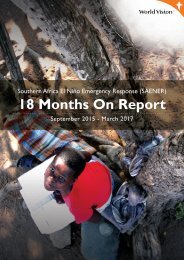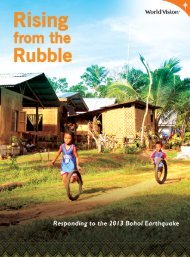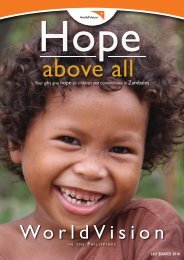INTER-AGENCY LIVELIHOOD ASSESSMENT - ARUA DISTRICT NORTHERN UGANDA GOAL
You also want an ePaper? Increase the reach of your titles
YUMPU automatically turns print PDFs into web optimized ePapers that Google loves.
The smoke also poses a high risk of respiratory diseases such as pneumonia to younger children<br />
and infants from poorer households who spend most of their time with their mothers in the kitchen<br />
cooking.<br />
Figure 36: Energy Source for Cooking<br />
Figure 37: Type of Energy Cook Stove<br />
Others<br />
Catering/Baking<br />
Business Skills<br />
Agricultural Skills<br />
Hairdressing<br />
Tailoring<br />
2%<br />
6%<br />
0%<br />
0%<br />
0%<br />
1%<br />
25% 98%<br />
93%<br />
Three Stone<br />
Lorena<br />
Others<br />
(Specify)<br />
4%<br />
5%<br />
1%<br />
4%<br />
98%<br />
95%<br />
91%<br />
One of the main concerns is availability of wood fuel. Refugees and the host communities are already<br />
harvesting unsustainably, resulting in deforestation, destruction of habitat and the environment’s<br />
capability to sustain the current and future population. Traditionally the collection of firewood in the<br />
host and refugee communities is mainly the work of women and children ( especially the girl child).<br />
The shortage of wood fuel is a concern for 81% of refugees and 79% of the host communities, as<br />
respondents expressed concerns about the availability of cooking energy.<br />
With 79% of refugees and 65% of the host communities stating it takes on average between one to<br />
two hours to collect firewood every day, this trend is likely to continue unless mitigation measures<br />
are put in place. About 20% of refugees and 35% of the host communities reported spending between<br />
two to four hours respectively, as seen in the figure above. Just 2% of the refugees reported spending<br />
more than 4 hours in search of a source of energy. The shortage of fuel for cooking negatively impacts<br />
children and women, as they travel further and spend more time gathering firewood to feed their<br />
families. The daily scrounge for firewood bars them from engaging in important activities such as<br />
participating in education, development and economic activities to better their lives. As they search<br />
for firewood, they also expose themselves to dangers such as attack and rape.










